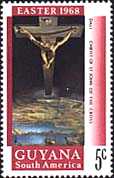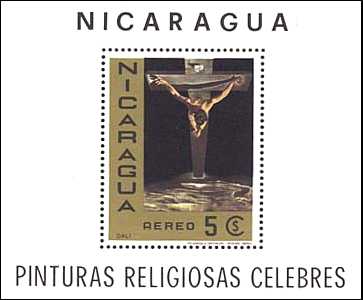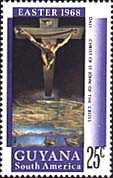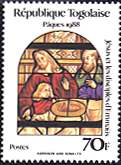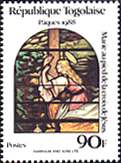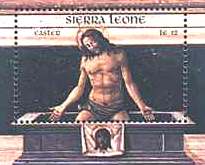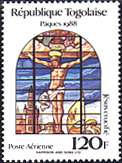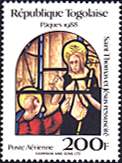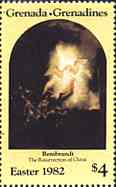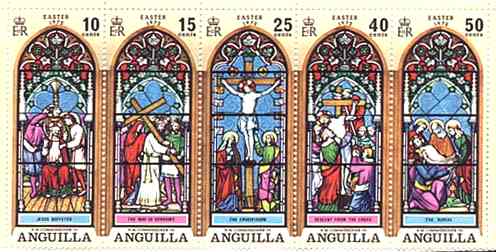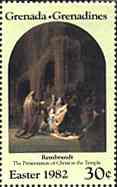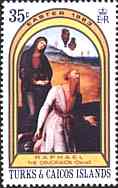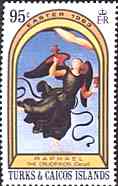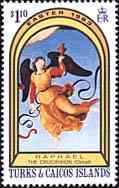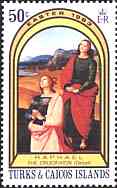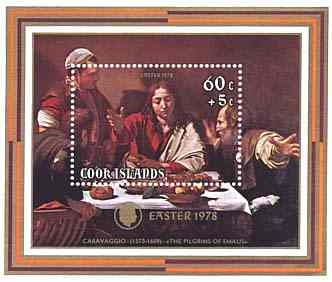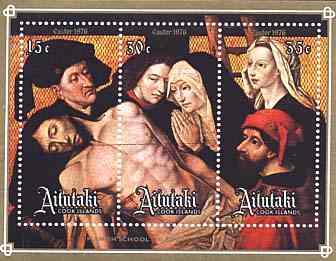
Easter, annual festival commemorating the resurrection of Jesus Christ, and the principal feast of the Christian year. It is celebrated on a Sunday on varying dates between March 22 and April 25 and is therefore called a movable feast. Various artists, old and modern masters alike, have given their interpretations of the events related to the history of the death and of the resurrection of Christ. Tip: please point on the stamps with the mouse index for supplementary information.
|
|
|
|
Connected with the observance of Easter are the 40-day penitential season of Lent, beginning on Ash Wednesday and concluding at midnight on Holy Saturday, the day before Easter Sunday; Holy Week, commencing on Palm Sunday, including Good Friday, the day of the crucifixion, and terminating with Holy Saturday; and the Octave of Easter, extending from Easter Sunday through the following Sunday. During the Octave of Easter in early Christian times, the newly baptized wore white garments, white being the liturgical colour of Easter and signifying light, purity, and joy.
|
|
|
|
|
|
Easter, a Christian festival, embodies many pre-Christian traditions. The origin of its name is unknown. Scholars, however, accepting the derivation proposed by the 8th-century English scholar St Bede, believe it probably comes from Eastre, the Anglo-Saxon name of a Teutonic goddess of spring and fertility, to whom was dedicated a month corresponding to April.
|
|
|
|
According to the New Testament, Christ was crucified on the eve of Passover and shortly afterwards rose from the dead. In consequence, the Easter festival commemorated Christ's resurrection. In time, a serious difference over the date of the Easter festival arose among Christians. Those of Jewish origin celebrated the resurrection immediately following the Passover festival, which, according to their Babylonian lunar calendar, fell on the evening of the full moon (the 14th day in the month of Nisan, the first month of the year); by their reckoning, Easter, from year to year, fell on different days of the week.
Christians of Gentile origin, however, wished to commemorate the resurrection on the first day of the week, Sunday; by their method, Easter occurred on the same day of the week, but from year to year it fell on different dates.|
|
|
|
|
Constantine I, Roman emperor, convoked the Council of Nicaea in 325. The council unanimously ruled that the Easter festival should be celebrated throughout the Christian world on the first Sunday after the full moon following the vernal equinox; and that if the full moon should occur on a Sunday and thereby coincide with the Passover festival, Easter should be commemorated on the Sunday following. Coincidence of the feasts of Easter and Passover was thus avoided.
|
|
|
Reform of the Julian calendar in 1582 by Pope Gregory XIII, through adoption of the Gregorian calendar, eliminated much of the difficulty in fixing the date of Easter and in arranging the ecclesiastical year; since 1752, when the Gregorian calendar was also adopted in Great Britain and Ireland, Easter has been celebrated on the same day in the Western part of the Christian world. The Eastern churches, however, which did not adopt the Gregorian calendar, commemorate Easter on a Sunday either preceding or following the date observed in the West. Occasionally the dates coincide; the most recent times were in 1865 and 1963. (After Microsoft Encarta 1996).
